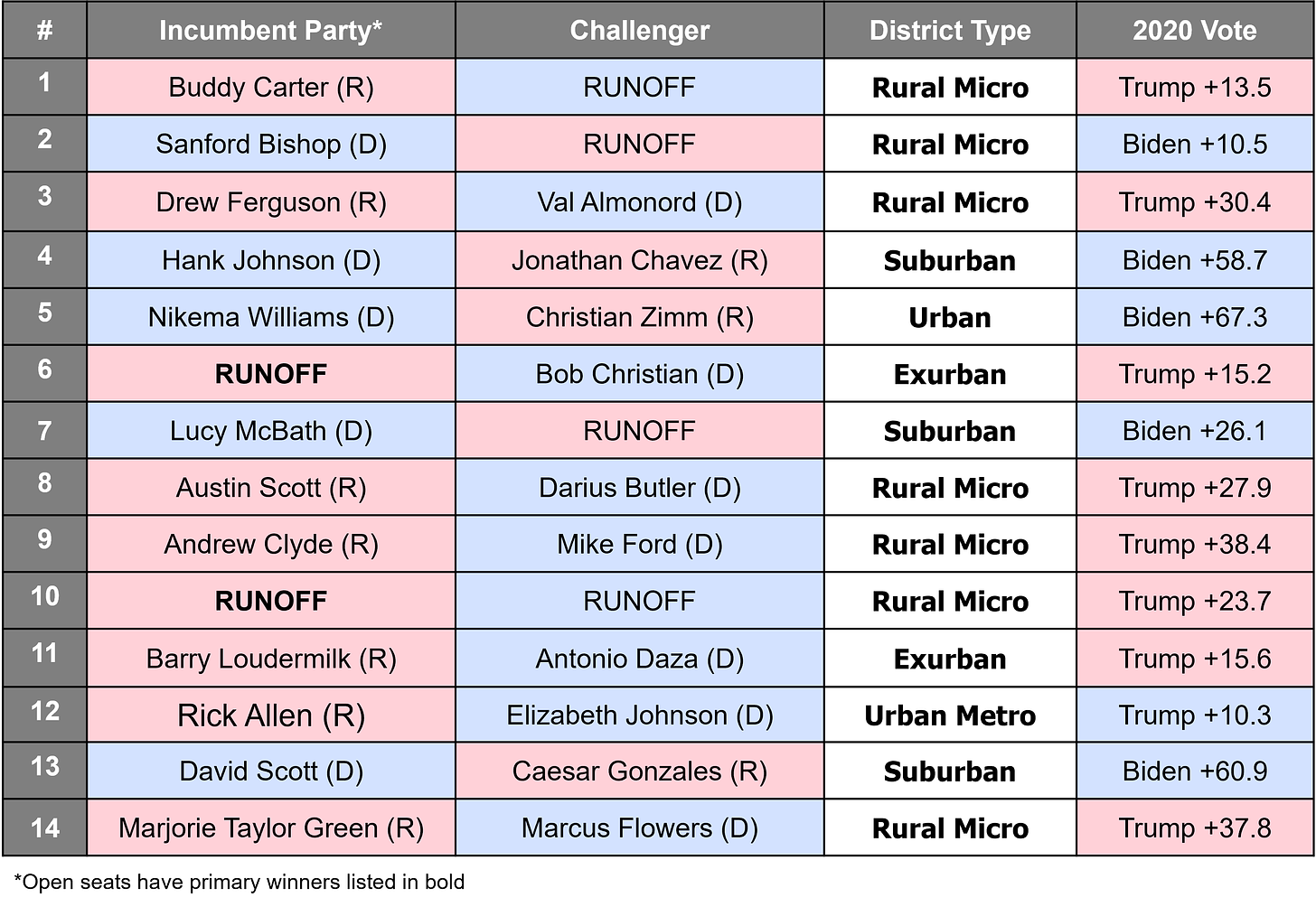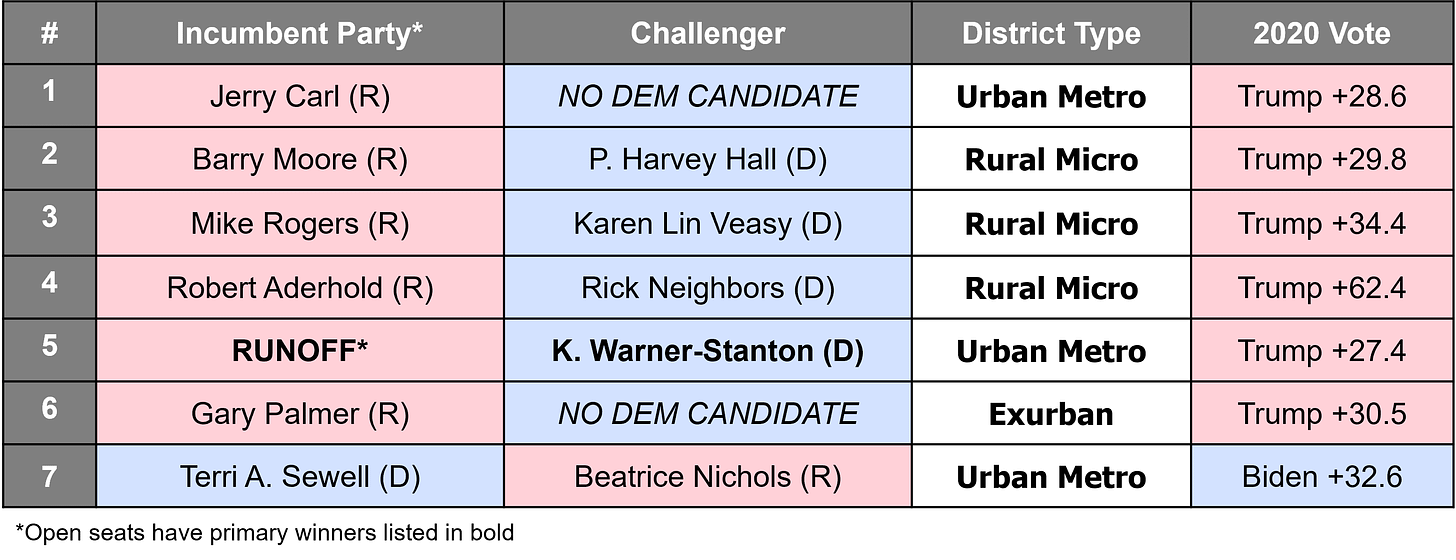Primary Takeaways: Moderate Dems on Life Support
This week's primaries prove the power of the party establishment (if its used effectively.)
Election Essentials
For all the hand-wringing over if Trump will play kingmaker or embarrass himself on the national stage, tonight’s primaries didn’t bring us any closer to a definitive answer.
Moderate Democrats have needed large amounts of establishment support to get themselves across the finish line, suggesting that Blue Dogs may be going extinct.
Following the recent tragedies across the nation, Republicans are doubling down on “states’ rights” rhetoric to avoid addressing practically any major issues on a national level.
US Senate Primary Winners
Gubernatorial Primary Winners
1. The media continues to play Trump’s endorsement game and has little to show for it.
Back in my first primary post I told y’all to ignore Trump’s endorsements because they’re not giving us much new information about the state of the Republican party.
Everyone already knows that Donald Trump currently has influence on Republicans across the country. He’s also still VERY unpopular: he has never won a popular vote in any election and he has never received a positive approval rating from a majority of Americans, both during and after his administration. (In fact he finished his presidential term with the worst approval rating average since the poll started in the 1940s.) You don’t need to look at the man’s endorsement record to know that he is simultaneously impactful and a frivolous distraction. The problem arises when journalists amplify his distractions, making them more impactful.
The easiest way to illustrate this is to briefly reflect on the effect of de-platforming Donald Trump. The value of removing Trump from Twitter didn’t just come from removing the microphone from his hands. It’s more that his messaging can’t spread as quickly via shares and retweets, because you literally can’t share tweets that don’t exist. The horse-race politics of tracking Trump’s endorsement record is a form of “retweeting” his preferred list of candidates, spreading his messaging farther than he’s able to on his own. If this sounds familiar, it’s because many journalists fell into this same trap back in 2016: obsessing over Trump’s every move places him back in the political spotlight.
Bringing it back to the week’s primaries, Trump’s endorsements were all over the place. For all the hand-wringing over if Trump will play kingmaker or embarrass himself on the national stage: WE ARE NO CLOSER TO ANSWERING THAT QUESTION. So why are we even asking it?
Georgia’s US House Primary Winners
2. Moderate Democrats are on life support and the party establishment is guarding the plug.
Progressives were ready to pull the plug on moderate Democrats awhile ago. Manchin and Sinema’s complacency in supporting Democratic policy in the Senate is only giving progressives more ammo against moderates. The party establishment however isn’t ready to roll-over and let moderate Democrats go extinct. Contrary to what conservative pundits may want you to believe, the Democratic party has not moved much to the left due to the way national politicians have vocally supported moderate candidates with progressive primary challengers.
Let’s start with TX-28: Nancy Pelosi, Jim Clyburn, and Steny Hoyer, the three highest ranking Democrats in the US House all forcefully supported pro-life candidate Henry Cuellar over progressive challenger Jessica Cisneros. Even with the backing of House Democratic leadership, the race is still undecided as barely 200 votes separate the two candidates.
Elsewhere in Texas, Jasmine Crockett was lifted to a win thanks to the establishment backing of retiring incumbent Rep. Eddie Bernice Johnson. We also saw this trend weeks ago in Ohio where the hot House primary between Nina Turner and Shontel Brown tipped in favor of the establishment-backed candidate (Brown).
The key ingredient here isn’t just money, it’s institutional support in campaigning. While big-money donations can be impactful, the most instrumental piece of winning campaigns in this midterm cycle lies in effectively organizing and mobilizing grassroots supporters. We’re witnessing how difficult it is to take on the national party establishment when it lends its vast organizing capabilities to local campaigns.
Alabama’s US House Primary Winners
3. Republicans have fully regressed to “states’ rights” rhetoric to explain their inaction.
The “states’ rights” strategy was unearthed with the Republican fight for voting restrictions. Then it re-emerged with abortion. Now it’s expanding to gun control and even domestic terrorism.
You read that right. Several Republicans think that states should be able to determine for themselves if they want to fight the unyielding virus of white supremacy. If a state doesn’t want to denounce and eradicate people who support and act on violent, racist rhetoric, that’s just their prerogative…
With this rhetoric, Republicans are running away from policies that a hefty majority of Americans support. Roughly six-in-ten Americans believe abortions should be legal in most cases. Another 60% of Americans believe that it’s either “somewhat” or “very” important that elected leaders pass stricter gun control laws. And again, 60% of Americans identified domestic terrorism as a serious threat to the country. This strategy may net Republicans wins in the most conservative corners of the country, but their ambivalence toward federal action on national issues may come off as complacency to independents and undecided voters.
There’s pretty much only one thing that unites Americans across the political spectrum: our country is headed in the wrong direction. While Democrats bear the difficult responsibility of taking ownership for the current state of the country, the common Republican response is either deeply unpopular federal action or no federal action at all. That’s not a winning strategy when Americans are desperate for elected leaders to do… well… anything.







